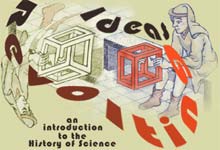
University of California, Irvine
Instructor: Dr. Barbara J. Becker

|
Week 10. New Worldview excerpt from from Nationalsocializmus und Wissenschaft (Munich, 1934), pp.
10-12
|
But aside from this fundamental National Socialist demand, the slogan of the international character of science is based on an untruth, insofar as it asserts that the type and the success of scientific activity are independent of membership in a national group. Nobody can seriously assert that art is international. It is similar with science. Insofar as scientific work is not merely imitation but actual creation, like any other creative activity it is conditioned by the spiritual and characterological endowments of its practitioners. Since the individual members of a people have a common endowment, the creative activity of the scientists of a nation, as much as that of its artists and poets, thus assumes the stamp of a distinctive Volkish type. No, science is not international; it is just as national as art. This can be shown by the example of Germans and Jews in the natural sciences.
Science is the knowledge of the uniform interconnection of facts; the purpose of natural science in particular is the investigation of bodies and processes outside of the human mind, through observation and, insofar as possible, through the setting up of planned experiments. The spirit of the German enables him to observe things outside himself exactly as they are, without the interpolation of his own ideas and wishes, and his body does not shrink from the effort which the investigation of nature demands of him. The German's love of nature and his aptitude for natural science are based on this endowment. Thus it is understandable that natural science is overwhelmingly a creation of the Nordic-Germanic blood component of the Aryan peoples. Anyone who, in Lenard's classic work Grosse Naturforscher (Great Investigators of Nature), compares the faces of the outstanding natural scientists will find this common Nordic-Germanic feature in almost all of them. The ability to observe and respect facts, in complete disregard of the "I," is the most characteristic feature of the scientific activity of Germanic types. In addition, there is the joy and satisfaction the German derives from the acquisition of scientific knowledge, since it is principally this with which he is concerned. It is only under pressure that he decides to make his findings public, and the propaganda for them and their commercial exploitation appear to him as degradations of his scientific work.
The Jewish spirit is wholly different in its orientation: above everything else it is focused upon its own ego, its own conception, and its self-interest--and behind its egocentric conception stands its strong will to win recognition for itself and its interests. In accordance with this natural orientation the Jewish spirit strives to heed facts only to the extent that they do not hamper its opinions and purposes, and to bring them in such a connection with each other as is expedient for effecting its opinions and purposes. The Jew, therefore, is the born advocate who, unencumbered by regard for truth, mixes facts and imputations topsy-turvy in the endeavor to secure the court decision he desires. On the other hand, because of these characteristics, the Jewish spirit has little aptitude for creative activity in the sciences because it takes the individual's thinking and will as the measure of things, whereas science demands observation and respect for the facts.
It is true, however, that the Jewish spirit, thanks to the flexibility of its intellect, is capable, through imitation of Germanic examples, of producing noteworthy accomplishments, but it is not able to rise to authentic creative work, to great discoveries in the natural sciences. In recent times the Jews have frequently invoked the name of Heinrich Hertz as a counter-argument to this thesis. True, Heinrich Hertz made the great discovery of electromagnetic waves, but he was not a full-blooded Jew. He had a German mother, from whose side his spiritual endowment may well have been conditioned. When the Jew in natural science abandons the Germanic example and engages in scientific work according to his own spiritual particularity, he turns to theory. His main object is not the observation of facts and their true-to-reality presentation, but the view which he forms about them and the formal exposition to which he subjects them. In the interest of his theory he will suppress facts that are not in keeping with it and likewise, still in the interest of his theory, he will engage in propaganda on its behalf. Only his theory is valid for him, and in the face of doubts he demands a faith in his theory as if it were a dogma. The dogmatic zeal and propagandistic drive of the Jewish scientist leads him to report on his achievements not only in scientific journals but also in the daily press and on lecture tours. The phenomenon, for example, of Jews pushing themselves prominently to the foreground at scientific congresses, such as the gatherings of German natural scientists and physicians, can be explained in the same way.
|